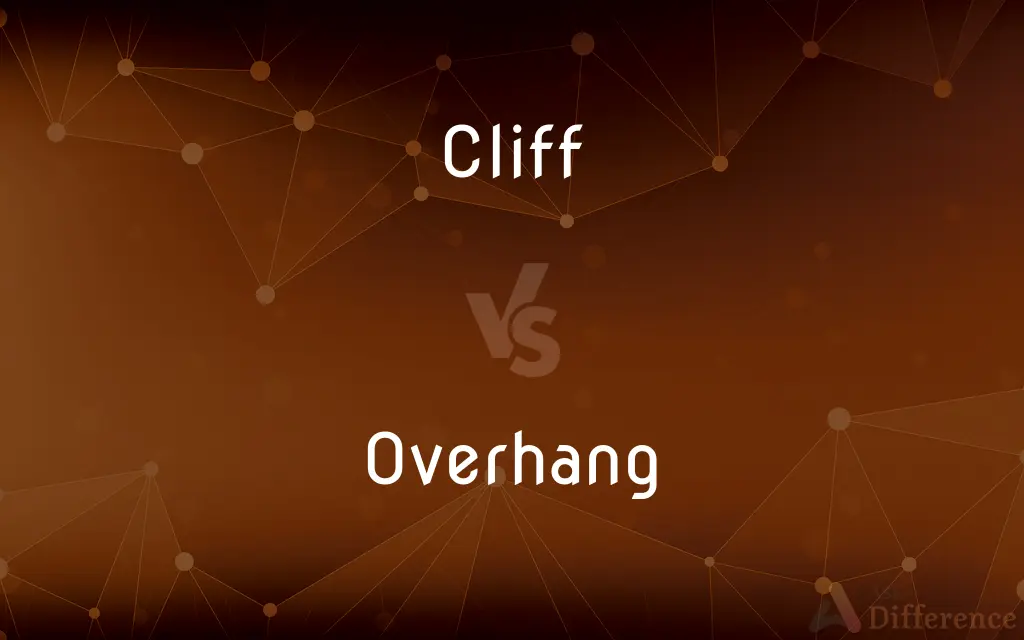Cliff vs. Overhang — What's the Difference?
By Urooj Arif & Fiza Rafique — Updated on April 3, 2024
A cliff is a steep rock face, especially at the edge of the sea, while an overhang features a portion of rock or structure protruding beyond a base support.

Difference Between Cliff and Overhang
Table of Contents
ADVERTISEMENT
Key Differences
A cliff is a high, steep face of rock or earth, typically formed by erosion or weathering, presenting a vertical or near-vertical drop. On the other hand, an overhang refers to any part of a structure, rock, or geological formation that extends beyond its base and juts out into space.
Cliff is often found along coastlines, in mountain ranges, or marking the edge of a plateau. Overhangs are common in rock climbing, where they present a challenging feature that requires strength and technique to navigate.
Cliffs provide unique ecosystems and are significant for geological studies, offering insights into the Earth's history through the exposed rock layers. In architecture, overhangs serve practical purposes, such as providing shade and protection from the elements.
Cliffs are prominent landmarks and offer challenging terrains for climbers, while also being susceptible to erosion processes that can lead to their gradual decline. Geological overhangs can be formed by differential erosion, where softer material beneath a harder layer is worn away, leaving the harder material unsupported.
Comparison Chart
Definition
A steep, high rock face, often by the sea.
A portion of a structure or rock protruding beyond its support.
ADVERTISEMENT
Formation
By erosion or weathering of rock/earth.
Through erosion or deliberate architectural design.
Significance
Geological studies, ecosystems, recreation.
Challenges in climbing, architectural design, and shade.
Examples
White Cliffs of Dover, Grand Canyon.
Overhanging rocks in Yosemite, architectural eaves.
Risks
Erosion, rockfalls.
Structural failure, climbing hazards.
Compare with Definitions
Cliff
A steep vertical or near-vertical rock face.
The climber marveled at the cliff's imposing height.
Overhang
A part of a structure that extends beyond its main support.
The house's overhang provided much-needed shade.
Cliff
The brink of a dangerous situation.
The company was on the cliff of bankruptcy.
Overhang
Challenge in physical activities.
The new climbing route features a daunting overhang.
Cliff
A geological formation signifying abrupt elevation changes.
The cliffs along the coast were formed by ancient glaciers.
Overhang
Architectural feature for weather protection.
The building's overhang protected visitors from rain.
Cliff
A place for challenging outdoor activities.
The adventure group organized a cliff diving event.
Overhang
A rock formation jutting out above a climber.
The climber carefully navigated the overhang.
Cliff
A high, steep side of a mountain or rock.
Eagles often nest on inaccessible cliffs.
Overhang
Geological feature formed by erosion.
Water erosion created an overhang in the sandstone.
Cliff
In geography and geology, a cliff is an area of rock which has a general angle defined by the vertical, or nearly vertical. Cliffs are formed by the processes of weathering and erosion, with the effect of gravity.
Overhang
To project or extend over
Trees that overhang the stream.
Cliff
A steep rock face, especially at the edge of the sea
A coast path along the top of rugged cliffs
Overhang
To loom over
The threat of nuclear war overhangs modern society.
Cliff
A high, steep, or overhanging face of rock.
Overhang
To project over something
In the shadow where the balcony overhangs.
Cliff
A vertical (or nearly vertical) rock face.
Overhang
A projecting part, such as an architectural structure or a rock formation.
Cliff
(figurative) A point where something abruptly fails or decreases in value etc.
Overhang
An amount of projection
An overhang of six inches.
Cliff
A high, steep rock; a precipice.
Overhang
(Nautical) The part of a bow or stern that projects over the water.
Cliff
See Clef.
Overhang
An excess of supply or capacity
An unusually warm winter created an overhang in oil stocks.
Cliff
A steep high face of rock;
He stood on a high cliff overlooking the town
A steep drop
Overhang
(transitive) To hang over (something).
Overhang
(intransitive) To impend.
Overhang
(economics) The volume that tips the balance between the demand and the supply toward demand lagging supply.
Overhang
(architecture) That portion of the roof structure that extends beyond the exterior walls of a building.
Overhang
A fatty roll of pubis flab that hangs over one's genitals; a FUPA.
Overhang
Anything that overhangs or protrudes over its base, such as a wave immediately before breaking, or a protruding cliff or rock wall.
Overhang
To impend or hang over.
Overhang
To hang over; to jut or project over.
Overhang
To jut over.
Overhang
In a general sense, that which just out or projects; a projection; also, the measure of the projection; as, the overhang is five feet.
Overhang
The projection of an upper part (as a roof, an upper story, or other part) of a building beyond the lower part; as, the overhang of a roof, of the eaves, etc.
Overhang
The portion of the bow or stem of a vessel that projects over the water beyond the water line.
Overhang
The projection of a part beyond another part that is directly below it, or beyond a part by which it is supported; as, the overhang of a shaft; i. e., its projection beyond its bearing.
Overhang
Projection that extends beyond or hangs over something else
Overhang
Project over
Overhang
Be suspended over or hang over;
This huge rock beetles over the edge of the town
Common Curiosities
What is a cliff?
A cliff is a steep, high face of rock or earth, often seen at sea coasts or mountain ranges.
What is an overhang?
An overhang refers to a part of a structure or geological formation that extends beyond its base, projecting into space.
How are cliffs formed?
Cliffs are typically formed through processes like erosion and weathering.
What causes an overhang to form in nature?
Geological overhangs can form through differential erosion, where softer material is eroded away beneath a harder layer.
Can cliffs have overhangs?
Yes, cliffs can have overhangs if part of their rock face extends beyond the base.
What challenges do overhangs present to climbers?
Overhangs require climbers to use strength and special techniques, making them challenging features.
Can an overhang be man-made?
Yes, many overhangs are architectural features designed for specific purposes.
How do cliffs and overhangs differ in their formation?
Cliffs form through large-scale processes of erosion or volcanic activity, whereas overhangs can result from more localized erosion or intentional architectural design.
What are the risks associated with cliffs?
Risks include erosion, rockfalls, and the danger of falling from great heights.
Are overhangs common in buildings?
Yes, architectural overhangs are common, often designed for aesthetic appeal or functional purposes like shade.
How do cliffs impact the environment?
Cliffs can create unique ecosystems and serve as barriers to movement, influencing local climates and habitats.
How do overhangs in architecture benefit buildings?
They provide shade, protection from the elements, and can enhance a building's aesthetic.
Is climbing a cliff the same as climbing an overhang?
Climbing a cliff involves vertical or near-vertical ascents, while climbing an overhang requires navigating a protruding rock face.
What makes cliffs significant for geological studies?
Cliffs expose rock layers, providing valuable insights into geological history and processes.
Why are overhangs important in rock climbing?
They offer technical challenges that test a climber’s skill, strength, and technique.
Share Your Discovery

Previous Comparison
Looking vs. Staring
Next Comparison
Repair vs. ServicingAuthor Spotlight
Written by
Urooj ArifUrooj is a skilled content writer at Ask Difference, known for her exceptional ability to simplify complex topics into engaging and informative content. With a passion for research and a flair for clear, concise writing, she consistently delivers articles that resonate with our diverse audience.
Co-written by
Fiza RafiqueFiza Rafique is a skilled content writer at AskDifference.com, where she meticulously refines and enhances written pieces. Drawing from her vast editorial expertise, Fiza ensures clarity, accuracy, and precision in every article. Passionate about language, she continually seeks to elevate the quality of content for readers worldwide.














































